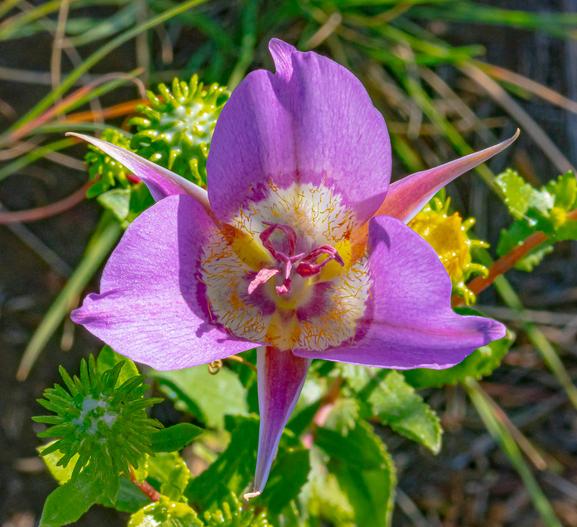Sagebrush Mariposa Lily
(Calochortus macrocarpus)
Sagebrush Mariposa Lily (Calochortus macrocarpus)
/
/

Murray Foubister
CC BY-SA 2.0
Image By:
Murray Foubister
Recorded By:
Copyright:
CC BY-SA 2.0
Copyright Notice:
Photo by: Murray Foubister | License Type: CC BY-SA 2.0 | License URL: https://creativecommons.org/licenses/by-sa/2.0/ | Uploader: Murray Foubister | Publisher: Flickr

































































Estimated Native Range
Summary
Calochortus macrocarpus, commonly known as Sagebrush Mariposa Lily, is a bulbous perennial herb native to the arid regions of the Pacific Northwest, particularly found in sagebrush deserts, dry grasslands, and open woodlands. It is indigenous to areas of Washington, Oregon, Idaho, and northern California. The plant typically grows to a height of 12 to 24 inches (30-60 cm). The Sagebrush Mariposa Lily has blue-green, grass-like leaves that complement its large, showy flowers. The blooms, which appear in June, are one to three inches in diameter, with three distinct petals and sepals. The petals are pink to purple, often with a darker purple or maroon blotch at the base, and the sepals are slightly longer, with green striping. This species does not produce notable fruit or berries.
The Sagebrush Mariposa Lily is valued for its drought tolerance and striking flowers, making it a suitable choice for xeriscaping and rock gardens. It is also used in native plant gardens and naturalized areas. Gardeners should note that it requires well-draining soil and can be sensitive to overwatering. It thrives in full sun to part shade and prefers a dry, dormant period in summer after flowering. While generally low-maintenance, it can be susceptible to bulb rot if kept too moist. There are no widely known popular garden cultivars of this species.CC BY-SA 4.0
The Sagebrush Mariposa Lily is valued for its drought tolerance and striking flowers, making it a suitable choice for xeriscaping and rock gardens. It is also used in native plant gardens and naturalized areas. Gardeners should note that it requires well-draining soil and can be sensitive to overwatering. It thrives in full sun to part shade and prefers a dry, dormant period in summer after flowering. While generally low-maintenance, it can be susceptible to bulb rot if kept too moist. There are no widely known popular garden cultivars of this species.CC BY-SA 4.0
Plant Description
- Plant Type: Herb
- Height: 1-1.7 feet
- Width: 0.4-0.7 feet
- Growth Rate: Moderate
- Flower Color: Purple
- Flowering Season: Summer
- Leaf Retention: Deciduous
Growth Requirements
- Sun: Part Shade, Full Sun
- Water: Low
- Drainage: Fast
Common Uses
Edible*Disclaimer: Easyscape's listed plant edibility is for informational use. Always verify the safety and proper identification of any plant before consumption., Low Maintenance, Showy Flowers
Natural Habitat
Native to sagebrush deserts, dry grasslands, and open woodlands in the Pacific Northwest
Other Names
Common Names: Green-Band Mariposa Lily, Sagebrush Mariposa, Calochorte À Gros Fruits, Greenband Mariposa Lily
Scientific Names: , Calochortus macrocarpus, Mariposa macrocarpa,
GBIF Accepted Name: Calochortus macrocarpus Douglas